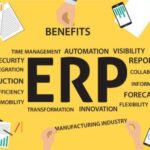Things to ask yourself before signing the bottom line

Selecting an enterprise resource planning (ERP) platform is a big commitment. The right system can transform your operations, customer relationships, and profitability for years to come. Today’s market moves fast: margins are tighter, customer expectations are higher, and technology is evolving rapidly. Before you sign on the dotted line, take the time to ask yourself these 10 questions to make sure your organization is ready to get the most from the investment.
1. Is leadership truly bought in?
Executive sponsorship is critical. Has your management team been directly involved in identifying pain points, setting goals, and planning the rollout? Without leadership alignment and accountability, adoption will stall and results will fall short.
2. Do you have subject matter experts at the table?
Every department needs a champion who understands current processes, challenges, and opportunities. These individuals will help shape best practices during implementation and act as the frontline for driving adoption.
3. Who will manage the project?
A dedicated project manager is essential, whether that is an internal resource or an external consultant. They should be involved from vendor selection through rollout, ensuring timelines are met and business needs stay front and center.
4. What high-impact problems are you solving first?
Do not try to tackle everything at once. Identify the top challenges such as shortening billing cycles, improving inventory accuracy, or boosting utilization rates, and prioritize those for immediate ROI.
5. How will you measure success?
Define clear business goals and metrics up front. Establish a baseline, then track improvements at 3, 6, and 12 months after go-live. Consider KPIs like project margins, billing turnaround, cash flow, and customer satisfaction.
6. What features will truly boost productivity?
Talk to your teams. Which tools, reports, or dashboards would make their jobs easier? Involving end users early will not only improve adoption but also help you evaluate vendors against real needs.
7. What best practices come built in?
Modern ERP is not just about software features, it is about methodology. Does the vendor offer proven best practices and guidance as part of implementation, or are you left to figure it out on your own?
8. Does the ERP fit your industry and growth plans?
Look for vendors who understand your market and can support requirements like multi-currency, multi-company, or industry-specific compliance. Ask yourself where your business will be in 3 to 5 years and whether the ERP can scale with you.
9. How flexible is the system?
Business models, customer demands, and markets are shifting quickly. Will your ERP adapt to new workflows, service models, or reporting needs without costly customization?
10. How scalable is the platform?
If you are 75 users today, what happens when you grow to 200? Can the system handle that growth without forcing you into a costly re-platforming project? A future-proof ERP should grow with you.
These 10 questions are a strong starting point to help you evaluate solutions with clarity and confidence, ensuring your ERP investment delivers long-term results.
Handpicked Related Content
-
How do you know when your technology integration business is ready to invest in ERP software? Calculating the return value of an investment can be daunting, even for the experienced executive, but one which includes new ERP Software may be…
-
When Is It Time for an ERP Upgrade? An ERP implementation can be costly and time-consuming. Deciding when to invest in a new ERP (Enterprise Resource Planning) software for your system integration business is a significant decision that can have…
-
Integrators often say that they want to replace their current software When I ask why, they normally respond with a list of short comings with their current technology. It is also not uncommon to receive a request for proposal,…
-
Is Your Business Ready for an ERP System? In the life cycle of every growing business, there comes a pivotal moment where the once small and agile team, capable of managing everything manually, starts to falter under the increasing complexity…





